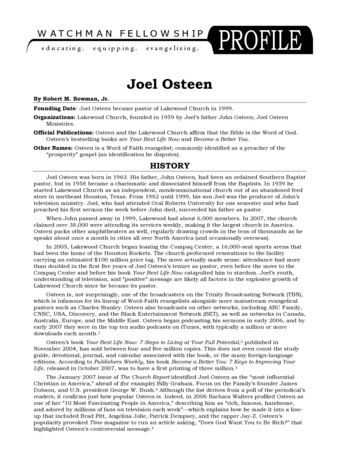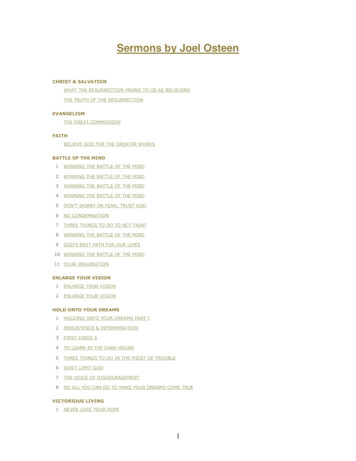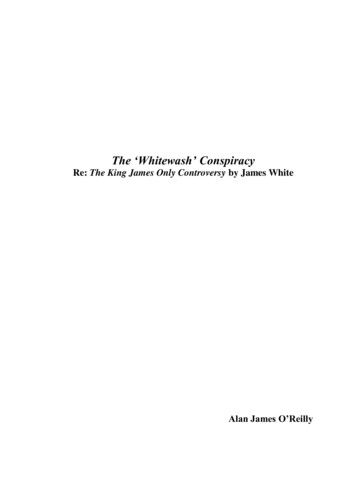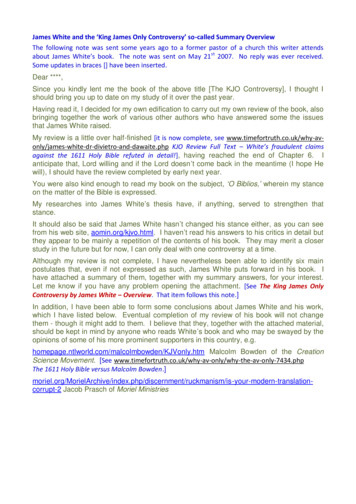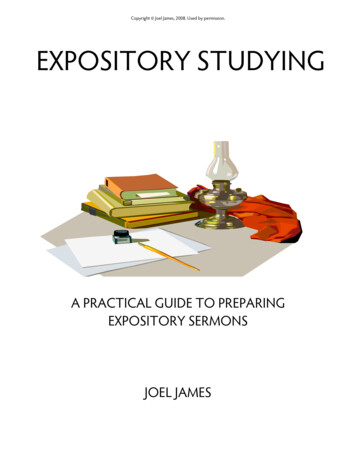
Transcription
Copyright Joel James, 2008. Used by permission.EXPOSITORY STUDYINGA PRACTICAL GUIDE TO PREPARINGEXPOSITORY SERMONSJOEL JAMES
Copyright Joel James, 2008. Used by permission.EXPOSITORY STUDYINGA Practical Guide To Preparing Expository SermonsbyJoel James
Copyright Joel James, 2008. Used by permission.EXPOSITORY STUDYINGA Practical Guide To Preparing Expository SermonsCopyright 2008, Joel JamesUnless otherwise indicated, all Scripture is taken from the NEW AMERICAN STANDARD BIBLE , Copyright The Lockman Foundation 1960, 1962, 1963, 1968, 1971, 1972, 1973, 1975, 1977,1995. Used by permission.DEDICATION:To my parentsTo Dad for teaching me the craftsman's ethic. To Mom for being editor-in-chief on all my writingprojects. To both of you for teaching me to love Christ and His church.
Copyright Joel James, 2008. Used by permission.COPYRIGHT NOTICEYou may distribute this booklet in electronic format or printed format on the following conditions:(1) It must be distributed free of charge,(2) No alterations are to be made to the text,(3) All copies must contain the following: Copyright Joel James, 2008. Used by permission.If you would like to use the booklet for purposes other than mentioned above, please contact:Word of the CrossPO Box 39263Garsfontein East0060South Africaorders@gracefellowship.co.za
Copyright Joel James, 2008. Used by permission.TABLE OF CONTENTS1.Preaching For God12.Grain Not Straw: The Kind of Preaching God Likes83.Is the Bible Sunshine or Fog?134.How to Interpret the Bible205.Grammar and Syntax: The Preacher's Friends436.Stripping a Sentence627.Block Diagramming728.Outlining and Summarizing a Text849.Studying Biblical Narrative9210.Diagramming and Outlining Narrative10811.Studying Proverbs11512.Studying Psalms13413.Conclusion149APPENDICES1.Block Diagramming Exercises1542.Plural Nouns170
Copyright Joel James, 2008. Used by permission.CHAPTER ONEPREACHING FOR GODMy father is a carpenter with a mania for boards that are straight, corners that are square,and joints that fit perfectly. I will never forget the summer we built a stoop on the side of ourhouse (he built; I fetched nails, screws, and tools as needed). When we came to the end of theproject, to his horror my father discovered that one side of the stoop didn't fit perfectly againstthe house. There was a gap of about one centimeter between the two, and to him it looked aswide as the Zambezi River at flood.My dad would rather nail his thumb to a board than build something that is crooked, so helooked at me and wailed, "How can it not fit? I'm sure I built it straight." I replied, "It's not a bigdeal, Dad, no one will ever see it." Dumb comment. In my father's estimation, all carpenters whoexcuse shoddy workmanship by mumbling, "No one will ever see it," should be chopped intosmall pieces and fed to crocodiles.Realizing I wasn't going to be much help, I went into the house to read while my father setabout the task of discovering just how the offending centimeter had come into existence. Abouthalf an hour later, he came in the back door with a wide grin on his face. "The house is crooked,"he burst out. "That's why it doesn't fit." All was right in his world again. The gap was still there, ofcourse, but it wasn't his fault; his stoop was straight, and that was all that mattered.Unfortunately my father didn't pass on any of his building skills to me. I confess, I am anabject failure when it comes to carpentry. But what he did pass on was a craftsman's standard: alove for precision and a delight in excellence for excellence's sake. My father works with wood; Iwork with God's words, but we both have a passion for cutting it straight.It was exactly that passion for quality workmanship that Paul hoped to kindle in Timothy,his son in the faith, when he wrote, "Be diligent to present yourself approved to God as aworkman who does not need to be ashamed, accurately handling the word of truth" (2 Tim 2:15).1
Copyright Joel James, 2008. Used by permission.That last phrase can be translated, cutting straight the word of truth. Paul also liked corners thatare square and joints that fit perfectly. As a tentmaker, Paul worked with leather, not wood (Acts18:3), but as with my father, precision must have been the hallmark of all Paul's labor. And Paulprodded Timothy to adopt that craftsman-like regard for accuracy when it came to interpretingthe Bible.You and I are just as responsible to be craftsmen cutting straight the word of God asTimothy was in the first century. Why? Because when you and I stand up to preach, we are doingsomething incredibly important. We are preaching for God.THE PREACHING GODGod is a preacher. According to the Old Testament, God's lips did not fall silent when Hefinished speaking the stars, planets, earth, and mankind into existence. God kept on speaking, andwhen He spoke, usually He was preaching. The most dramatic example of God's preaching waswhen He uttered the Ten Commandments at Mt. Sinai. Sinai was the greatest open-air preachingevent in the history of the world. After two days of preparation, nearly two million peoplecrowded around the base of the mountain, careful to respect the boundary lines set by Moses—approaching the holy God too closely meant sure death for man or beast. But who could preachto a congregation of two million people? Only God.And preach He did. The mountain was the pulpit; the sermon had ten points. God Himselfwas the preacher, speaking to His trembling congregation in an awesome divine voice. Is it anywonder that the people stood at a distance and begged that in the future God speak to themthrough Moses? When God preaches, He preaches with power!In the centuries that followed Sinai, God continued to preach—not in an audible divinevoice, but through the faithful voices and inspired messages of the prophets. In fact, Jeremiah saidthat God rose early each morning, diligently, faithfully, perseveringly sending His prophets toIsrael. When the people refused to heed the chiding, pleading voices of the prophets, God2
Copyright Joel James, 2008. Used by permission.lamented, "They did not listen to Me" (Jer 7:26). God preached at Sinai; He continued to preachthrough the prophets.When God the Son, the second person of the Trinity, came in human flesh, the Father wasstill preaching. The apostle John called Jesus the Word in John 1:1. It is within the bounds of theword logos to say that John called Jesus the Sermon. "God, after He spoke long ago to the fathersin the prophets in many portions and in many ways, in these last days has spoken to us in HisSon " (Heb 1:1-2). God is a preaching God, and Jesus Christ is His greatest sermon.In Jesus Christ, God was still the God of Sinai—a preaching God. One of my treasuredglimpses of Jesus' ministry is the Sermon on the Mount: a simply dressed carpenter surroundedby the grass, flowers, rocks, and birds of Galilee, proclaiming His authoritative divine law to a hostof listeners. It was quieter than Sinai; it wasn't as dramatic as Sinai. There was no fire, smoke, earthtremors, or blinding glory as at Sinai, but once again the pulpit was a mountain, the subject wasGod's law, and God Himself, the second person of the Trinity, was the preacher. In fact, Jesushighlighted the importance of His preaching ministry when He said, "Let us go somewhere else tothe towns nearby, so that I may preach there also; for that is what I came for" (Mark 1:38).PREACHING FOR GODGod preached then, but is He still preaching today? He is, for He remains the preachingGod. In our era God doesn't preach in an audible voice as He did at Sinai. Neither does he preachby means of inspired, revelatory messages as He did during the days of the Old Testamentprophets. In our era, God preaches through faithful men who proclaim His word, the Bible. Whena preacher today accurately preaches God's written word, it is as if God speaks again. It is nochance occurrence that the command, "Preach the word," comes only three verses after "AllScripture is inspired by God " (2 Tim 4:2; 3:16). Inspiration means that every time we open ourmouths and accurately preach the Bible, it is as if God were preaching.If we faithfully preach God's word, God's voice is heard; if we don't, it isn't. That is one ofthe reasons I preach: God must have a voice. God must be heard. I would not choose me to be His3
Copyright Joel James, 2008. Used by permission.voice; I would not choose any man to be God's voice. But if the sovereign, all-powerful, preachingGod has chosen to employ men as His lips and larynx, then I echo Isaiah's humble, "Here I amLord; send me."How startling that God should use men—even saved, Christ-loving men—to be His voice.But God's wisdom infinitely excels our own. God received glory when He preached at Sinai in anearthquake-like voice, but He receives even more glory when He preaches through the feeble,chirping voices of insignificant, insect-like men. How so? Anyone can cut down a tree with a sharpaxe, but only an exceptionally strong man can cut down a tree with a dull axe. When God uses thedull axe of human preachers to chop down the trees of sin and unbelief, His glory is doubled. Itproves the incomparable strength of His arm.STUDYING FOR GODPreaching for God—what a noble task! One can understand Martin Luther's outburst, "If Icould today become king or emperor, I would not give up my office as preacher."1 To speak forGod is a greater task than ruling a kingdom. But what if you get it wrong? What if, when youpreach for God, you preach inaccurately, incorrectly? What if you say something God didn't say?If God is going to use your lips to preach His sermons, you had better get it right. Oh, fordirect revelation! The prophets were assured of speaking exactly what God said because He putHis words in their mouths in the same way He inspired the Scripture: "Men moved by the HolySpirit spoke from God" (2 Peter 1:21; cf. Jer 1:9). But we are not revelatory preachers.Is there, then, no hope of preaching God's words? Of course there is hope—evencertainty. The doctrine of inspiration means that every time you open your Bible, interpret itcorrectly, and explain it accurately, you are preaching God's very words—a sermon God Himselfwould preach. God's voice is heard when you repreach what God already preached through thepens of men like Moses, Isaiah, Matthew, Paul, and Peter.1Fred W. Meuser, Luther the Preacher (Minneapolis: Augsburg Publishing House, 1983), 39, quoted in John Piper, TheLegacy of Sovereign Joy: God's Triumphant Grace in the Lives of Augustine, Luther, and Calvin (Wheaton, Ill.: Crossway Books,2000), 86.4
Copyright Joel James, 2008. Used by permission.It is a grand privilege to preach for God, but to preach for God you must first study forGod. Paul told Timothy to "Preach the word" (2 Tim 4:2), but Timothy could only fulfill thatcommand after he had fulfilled this one: "Be diligent to present yourself approved to God as aworkman who does not need to be ashamed, accurately handling the word of truth" (2 Tim 2:15).In Africa, we are often guilty of violating Paul's instruction—much preaching has no workman-likestudy behind it. We might preach loudly, we might preach for an hour, we might preach so thatpeople are moved, but if we have not explained God's words with such accuracy that God wouldclaim our sermons as His own, then we have not preached for God. Today, God preaches onlywhen men like you and me faithfully repreach the living, boiling, bubbling, powerful, divine wordsof the Bible.Here then is the question: What study method can you use to guarantee you will preachsermons that resay what God said? In a sense no man can preach for God: Methuselah is not oldenough; Solomon is not wise enough. But if you study in such a way that your sermons resay whatGod said in the Bible, then you become God's voice. To say it another way, expository preachingrequires expository studying.Preparing your sermons in such a way that you resay what God said is a demandingprocess. But whether you are studying from the original languages (which is best) or from yourEnglish, Zulu, Sotho, or Swahili Bible, the study process you'll learn in this book will produce clear,biblical sermons—sermons that explain and apply God's very words.BLOCK DIAGRAMMINGThe study method I want to teach you is called block diagramming. It's an approach tostudying the Bible that makes you think about each individual piece of the text and about the textas a whole. It forces you to discover what God said, which is the key to preaching for God.Sermons will differ from preacher to preacher, from church to church, and from culture toculture. A sermon that works well in my Western church in Pretoria might not work so well in avillage church. African congregations usually prefer more repetition, more volume, and more5
Copyright Joel James, 2008. Used by permission.passion than Western congregations. That's perfectly acceptable; expository preaching doeshave cultural components. But what cannot change, regardless of the setting, is a commitment toresaying what God said. If you don't do that, then you have not preached for God. Therefore, allpreachers, regardless of their culture, must study in a way which produces sermons that allowGod to speak. Preparing sermons from a block diagram is a great way to do that.What is a block diagram? It's a way of arranging the words of Scripture on a page so thatyou can discover the meaning of a passage. For example, Genesis 1:1 can be diagrammed thisway:God created the heavens and the earthin the beginningCan you see who created, what He created, and when He created it? The block diagramshows you exactly what the passage is about; it reveals God's mind based on the words He used.When you preach Genesis 1:1, if you preach the who, when, and what of creation, you haverepreached God's words.Is block diagramming hard work? Sure it is. Imagine a shepherd standing at the mouth of adeep well surrounded by his flock of thirsty sheep. Their bleating voices call urgently for thewell's life-sustaining water. To get at the water, the shepherd has to lower a bucket into the wellon the end of a rope, fill it, and then pull the bucket back up. Only by means of raw hands and astraining back can he keep his anxious sheep from dying of thirst.That's what studying to preach for God is like. God's word is the well that yields the waterof life. You, the preacher, cannot give your congregation sand; you must give them water—God'swater. Therefore, every week you lower the bucket of your mind deep into the Bible. You fillyour bucket as you study, and then pull it up hand-over-hand.The stagnant pool of human wisdom lies near at hand. It's easy for a preacher to dip hisbucket there—it takes virtually no work at all—but that water will poison the sheep. If you wantpure water, you'll have to lower and raise your bucket into the Bible, a diligent workman handling6
Copyright Joel James, 2008. Used by permission.accurately the word of truth. If you are faithful to do so, on Sunday God will have a voice; as youpreach His words, God will speak again. That's how God, the preaching God, preaches today.Luther was right. It is better to be a preacher than a king, but to preach for God you must firststudy for God.7
Copyright Joel James, 2008. Used by permission.CHAPTER TWOGRAIN NOT STRAW: THE KIND OF PREACHING GOD LIKESLike all Christians, African believers urgently need Bible teaching. But too rarely do ourpreachers actually explain the text of Scripture in their sermons. More commonly, the preacherreads a text before the sermon, and then dismisses it from the room as if it were a child too youngto contribute to what follows. Instead of explaining God's words, the preacher mixes a dangeroushomemade brew of his own vaguely biblical ideas, sweetens his concoction with a few stories, andcompletes the recipe by adding a heavy dose of passion to make it intoxicating. If uncertain ofwhat to say next, he interjects an enthusiastic "Amen?" or "Hallelujah!" and while the congregationresponds, he scrambles to come up with his next idea.God is gloriously majestic and utterly authoritative: He can't be pleased when His wordsare virtually ignored during the sermon. In fact, when comparing the relative value of humanwords and His words, God asked, "What does straw have in common with grain?" (Jer 23:28). Notmuch. Grain is what you put in the feed box; straw is what you scatter on the stable floor. Whichoption will you choose? Will you explain God's words or will you scatter the chaff of humanideas?A friend of mine was once asked, "What did you do before you learned to preachexpository sermons?" He replied sheepishly, "I made a lot of noise." He wasn't preaching God'sword, but since his straw-scattering was done with enthusiasm, people listened. While there isnothing wrong with preaching with a loud voice, there is something drastically wrong when apreacher teaches his own vague ideas about God and Christ rather than the Bible's authoritativewords about God and Christ.In fact, God said that it is an "appalling and horrible thing" when spiritual leaders rule ontheir own authority instead of teaching His words (Jer 5:30-31). Ultimately, God rejects allpreachers who teach their words instead of His own: "Do not listen to the words of the prophets8
Copyright Joel James, 2008. Used by permission.who are prophesying to you. They are leading you into futility; they speak a vision of their ownimagination. But if they had stood in My council, then they would have announced My words toMy people" (Jer 23:16, 22).A preacher who chooses to preach his own ideas rather than God's words in the Bible,opts for a stone rather than bread, a serpent rather than a fish, straw rather than grain. To suchmen the prophet Isaiah trumpets: "To the law and to the testimony! If they do not speakaccording to this word, it is because they have no dawn" (Isa 8:20). God's words are grain; God'swords are light. A preacher speaks a valuable message only when he repreaches God's words: theBible.EXPOSITORY PREACHINGPreaching that repreaches God's words is called expository preaching. The wordexposition means "a detailed explanation of something."2 You've probably heard a lot of sermonsthat weren't a detailed explanation of anything. It's time to change that trend. In the words of JohnMacArthur, to preach expositorily means to preach "in such a way that the meaning of the Biblepassage is presented entirely and exactly as it was intended by God."3 Expository preaching isresaying what God said.Nehemiah 8 records a classic biblical example of this kind of preaching. When Nehemiahtook up his commission as governor of the Persian province of Judah in 444 BC, the most obviousneed in Judah was to rebuild and repopulate Jerusalem. Not so obvious (but far more urgent) wasthe need to rebuild the hearts of the people. For that task, bricks and mortar would not do; God'sword was needed.Ezra was the brick mason recruited by Nehemiah to rebuild the people's hearts. Nehemiah8 records Ezra's preaching with three critical repetitions: to call out or read aloud (4x), the bookof the Law (4x), and to understand or discern (9x). Nehemiah's summary came in 8:8, "[They] read23Webster's New World Dictionary, 2nd College ed. (New York: Simon and Schuster, 1984), s.v. "Exposition."John MacArthur, Jr., "The Mandate of Biblical Inerrancy: Expository Preaching," in Rediscovering Expository Preaching,John MacArthur, Jr. and The Master's Seminary Faculty (Dallas: Word Publishing, 1992), 23-24, emphasis original.9
Copyright Joel James, 2008. Used by permission.from the book, from the law of God, translating to give the sense so that they understood thereading." Ezra and his fellow preachers read the text and explained the text, so that God's peoplewould understand and live the text. That's expository preaching. And God used it. After Ezra andhis helpers preached, the people broke the bonds of nine hundred years of disobedience bycelebrating the Feast of Booths for the first time since the days of Joshua (8:13-17).This is the same kind of preaching that Paul exhorted Timothy to employ in 1 Timothy4:13: "Until I come, give attention to the public reading of Scripture, to exhortation andteaching." What was the procedure? Timothy was to read the Bible out loud so that all couldhear. Then he was to explain it clearly and to encourage his listeners to obey it.More than any other style of preaching, expository preaching puts the congregation indirect contact with God's words, and that's where the power is. God's words "give the wisdomthat leads to salvation" (2 Tim 3:15); they produce godly living: "Sanctify them in the truth; Thyword is truth" (John 17:17).Sermons that do not focus on explaining and applying God's words are powerlesssermons. A fire has no power to warm you if you sit far from it, but if you move close to theflames, the warmth goes right through you. In the same way, when a preacher keeps Christ'speople far from the fire of God's word by not explaining the text of Scripture in his sermons, thepeople freeze to death. But when a preacher draws his people close to the Bible with explain-thetext, expository preaching, they are warmed and made spiritually alive.Only God's words can save sinners and sanctify saints. Unbelief is a hardy weed: it will notwither and die at the sound of the preacher's voice. Satan is a strong prince: he does not tremblewhen the preacher tells his entertaining stories. If the preacher has a powerful personality and adominating delivery, his congregation will momentarily forsake their sinful passions whensteamrolled by his Sunday onslaughts. However, once out of earshot, their selfish desires willreturn as strong as ever, and they will remain unchanged. On the other hand, God's words areinfinitely greater than the preacher's words. They uproot the weed of unbelief. They unnerve theprince of darkness. They restrain the passions of self.10
Copyright Joel James, 2008. Used by permission.HOW TO FEED HORSESWhen I was young, my parents owned several horses. In the winter, because of the intensecold, my father fed those horses grain to keep them fat and strong. Needless to say, the horsesloved it. They would crowd around my father, their agile, slobbery lips eagerly devouring thegrain out of his hand. Horses, however, are pretty smart creatures. They quickly observed thatwhen my father's hand was empty, he would reach into the feed bucket he held in his other handto get a second helping. Seeing this, the horses learned to ignore his outstretched right hand withits meager offering of grain: contemptuously brushing past it, they plunged their noses directlyinto the feed bucket held in his left hand. Why be content with a snack when you can have thewhole meal?As a preacher, never hold the Bible in one hand and feed your people from the other.Feed them directly from the hand that holds the Bible, from the Bible itself. Don't give them apalmful of kernels in your sermon; plunge their noses directly into the corn and oats of God'sword. That's what expository preaching is about: Stop scattering straw, and give God's peoplegrain!THE GRAVITATIONAL PULL OF THE BIBLEOnly a fool would try to teach the mind of God without using the words God Himselfspoke. John Piper rightly rebukes preachers who take their theology and their sermons fromGod's word in some vague, disconnected way.One of the biggest problems I have with younger preachers I am called on tocritique is that they fail to quote the texts that support the points they aremaking. We need to get people to open their Bibles and put their fingers on thetext. Then we need to quote a piece of our text and explain what it means. Tellthem which half of the verse it is in. People lose the whole drift of a message whenthey are groping to find where the pastor's ideas are coming from.44John Piper, The Supremacy of God in Preaching (Grand Rapids: Baker, 1990), 41.11
Copyright Joel James, 2008. Used by permission.Your sermons should revolve around your text as faithfully as the earth revolves aroundthe sun; your words must never escape the gravitational pull of God's words. When your listenerssee that your sermons come right out of the Bible, they will start to trust you: in your sermonsGod's word is king. Furthermore, they will start to read their own Bibles. Expository preachingtends to produce Bereans—believers who search the Scriptures daily to see if these things aretrue (Acts 17:11).Good preachers allow God's words to dominate their sermons as a potter's handsdominate the clay. In the words of Walter Kaiser, "The whole objective is to let the Scriptureshave the major, if not the only, role in determining the shape, logic, and development of ourmessage."5 How many sermons have you heard (or preached) that failed to hit that target? If theconnection between the text read and the sermon preached is fuzzy at best and nonexistent atworst, God will not claim your sermon as His own. If you want to preach for God, you mustprepare your sermons in such a way that God's words shape them like clay. That's what this bookis about.5Walter Kaiser, Toward an Exegetical Theology (Grand Rapids: Baker, 1981), 160.12
Copyright Joel James, 2008. Used by permission.CHAPTER THREEIS THE BIBLE SUNSHINE OR FOG?Before we learn how to block diagram a passage of Scripture, we need to answer twopreliminary questions: Is the Bible an understandable message from God? If it is, how should we interpret it?A few years ago the governing board of a major evangelical seminary in the United Statesappointed a new seminary president. Unfortunately, many of the lecturers at that seminary nolonger believed or taught the biblical truths championed by the seminary's doctrinal statement.Therefore, the president's first job was to clean house theologically; the liberal lecturers had tobe weeded out.The new president took a direct approach to his assignment. He met with every lecturerand gave him or her the option to sign the doctrinal statement in good faith or to resign. Whenconfronted with those two alternatives, one of the lecturers replied coldly, "I can make thatdoctrinal statement mean anything I want." The president calmly responded, "You're fired." Thelecturer retorted, "You can't fire me. I have tenure at this school, and my contract says thatbecause of that, you can't fire me." To which the president replied, "I can make that contract meananything I want."That lecturer wanted communication to be unclear only when it was convenient for her.She believed that God's word and her school's doctrinal statement could be interpreted a dozendifferent ways, but when it came to the contract that protected her salary, she demanded anaccurate, literal, grammatical, historical, objective interpretation. She refused to give God whatshe demanded for herself and her contract.13
Copyright Joel James, 2008. Used by permission.We cannot accept such double standards. Every day we rightly assume that accurate,understandable, one-meaning communication is possible in the human realm. It is equally possiblewhen God speaks.Is the Bible sunshine or fog? Light or darkness? Clear or obscure? As a preacher, can youopen your Bible expecting (with some hard work) to understand what God said? Is it possible tofind God's meaning when you study the Bible? There are at least seven reasons why you can beconfident that the Bible has one clear meaning for all people everywhere, and therefore, can beinterpreted and preached objectively and accurately.1) THE BIBLE WAS WRITTEN TO REVEAL TRUTH, NOT TO HIDE ITThe Bible itself says that God revealed the Scripture so that men and women can read it,understand it, and obey it. David wrote, "The law of the Lord is perfect making wise thesimple" (Ps 19:7). The Bible was written to make clear, not to confuse. In Isaiah God said, "I havenot spoken in secret, in some dark land" (Isa 45:19); God spoke to be heard and understood. Justbefore his death, Moses assured Israel that they would not have to make a special trip to heavenor sail far across the sea to discover and obey God's commands. God's mind was publicly andunderstandably revealed in His law.For this commandment which I command you today is not too difficult for you, noris it out of reach. It is not in heaven, that you should say, "Who will go up toheaven for us to get it for us and make us hear it, that we may observe it?" Nor is itbeyond the sea, that you should say, "Who will cross the sea for us to get it for usand make us hear it, that we may observe it?" But the word is very near you, inyour mouth and in your heart, that you may observe it (Deut 30:11-14).God gave the Bible to be understood and obeyed; therefore, while interpreting the Bibleis a difficult task, it is not an impossible one.6 His purpose for speaking was to make wise thesimple, to reveal truth, not to hide it.6Dan McCartney and Charles Clayton, Let the Reader Understand: A Guide to Interpreting and Applying the Bible,2nd ed. (Philipsburg, New Jersey: P & R Publishing 1994, 2002), 38-39.14
Copyright Joel James, 2008. Used by permission.2) GOD IS BOTH CREATOR AND COMMUNICATORA second reason you can come to the Bible expecting to find a clear, understandablemessage is God is both Creator and Communicator.7 The same God who created you also spokethe Bible. A Communicator who created the listeners to whom He speaks can speak in a way thatthey can understand. David wrote, "O Lord, You have searched me and known me [You] areintimately acquainted with all my ways" (Ps 139:1, 3). The God who knows human beings and alltheir ways that intimately can write a message they can understand.3) INSPIRATION GUARANTEES AN ACCURATE MESSAGEYou can also expect to discover God's message when you study the Bible becauseinspiration guarantees an accurate message. The Bible is not a pond disturbed by a p
3. Is the Bible Sunshine or Fog? 13 4. How to Interpret the Bible 20 5. Grammar and Syntax: The Preacher's Friends 43 6. Stripping a Sentence 62 7. Block Diagramming 72 8. Outlining and Summarizing a Text 84 9. Studying Biblical Narrative 92 File Size: 2MB
